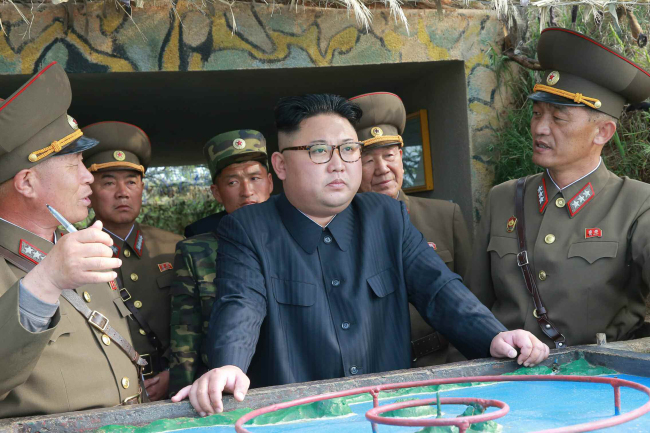The lower house of the US Congress on Friday overwhelmingly approved legislation designed to impose tougher sanctions on North Korea, leaving South Korea’s next government with the challenge of how to navigate through mounting tension between Pyongyang and Washington.
Titled “The Korea Interdiction and Modernization of Sanctions Act,” the bill cleared the House of Representatives in a bipartisan 419-1 vote. Introduced in March, the bill was designed to expand sanctions on North Korea’s oil imports, labor exports and shipping industry. It has to pass through the Senate to become law.
The move came just days before South Korea elects its new president Tuesday, with speculation mounting that leading candidate Moon Jae-in might shift away from the previous hawkish stance against Pyongyang, if elected, despite mounting pressure from the US and China on Pyongyang’s nuclear ambitions.
“We believe (the bill) will deliver a stern warning to North Korea, who totally disregard the international community’s call for denuclearization,” the South Korea Foreign Ministry said in a statement. “It will lay the groundwork for drawing North Korea’s sincere efforts to denuclearize the country.”
Titled “The Korea Interdiction and Modernization of Sanctions Act,” the bill cleared the House of Representatives in a bipartisan 419-1 vote. Introduced in March, the bill was designed to expand sanctions on North Korea’s oil imports, labor exports and shipping industry. It has to pass through the Senate to become law.
The move came just days before South Korea elects its new president Tuesday, with speculation mounting that leading candidate Moon Jae-in might shift away from the previous hawkish stance against Pyongyang, if elected, despite mounting pressure from the US and China on Pyongyang’s nuclear ambitions.
“We believe (the bill) will deliver a stern warning to North Korea, who totally disregard the international community’s call for denuclearization,” the South Korea Foreign Ministry said in a statement. “It will lay the groundwork for drawing North Korea’s sincere efforts to denuclearize the country.”

Designed to focus on cutting off access to the cash North Korea needed to advance nuclear and missile technology, the bipartisan bill includes tougher measures that were not included in the previous US legislation and United Nations resolution against North Korea.
Under the bill, ships owned by North Korea, or by countries that refuse to comply with UN resolutions against it, are banned from operating in American waters or docking at US ports. Goods produced by North Korea’s forced labor would be prohibited from entering the United States, according to the legislation.
The legislation requires the US administration to determine within 90 days whether the North is a state sponsor of terrorism. It also authorizes sanctions on the entities who provide the North with crude oil and other related petroleum products.
“The threat from North Korea is real, and real threats demand real responses. This bill gives the administration a powerful tool to cut off North Korea‘s funding by going after those who do business with the regime,” Rep. Ed Royce, chairman of the House Foreign Affairs Committee and a co-sponsor of the bill, said in a statement.
China’s Foreign Ministry criticized the measure, saying Beijing opposes unilateral sanctions from an individual government and the US should stop worsening military tension on the Korean Peninsula.
The measure came amid the Trump administration’s increased pressure on Pyongyang, with US Secretary of State Rex Tillerson saying “a lot of work” was left to maximize its pressure, including additional penalties, secondary sanctions and tighter implementation of UN resolutions.
China has also ramped up its own pressure against North Korea by imposing a sweeping ban on Pyongyang coal exports and threatening to cut off oil supplies, a move Pyongyang denounced as a “betrayal.” North Korea has virtually no domestic oil production, and has traditionally imported oil from China.
The two superpowers’ increased pressure on Pyongyang coincides with South Korea’s presidential race, which has been dominated by liberal front-runner Moon Jae-in of the Democratic Party of Korea, an advocate of engagement with the North.
Since South Korea removed former President Park Geun-hye from power, Moon has been little challenged in local polls, maintaining a strong lead over his conservative opponent Hong Joon-pyo of the Liberty Korea Party, who has called for a hard-line stance against the North.
In a recent interview with The Korea Herald, Moon vowed to directly negotiate with North Korea’s leader Kim Jong-un over nuclear issues, saying South Korea has been reduced to a “spectator” following the previous conservative governments led by former Presidents Lee Myung-bak and Park Geun-hye.
“In order to resolve the North Korea issue peacefully, pressure and sanctions should come first before having talks for the sake of talks,” said Choi Kang, vice president of the Asan Institute for Policy Studies, during a seminar Friday.
By Yeo Jun-suk (jasonyeo@heraldcorp.com)


![[Exclusive] Korean military set to ban iPhones over 'security' concerns](http://res.heraldm.com/phpwas/restmb_idxmake.php?idx=644&simg=/content/image/2024/04/23/20240423050599_0.jpg&u=20240423183955)




![[Pressure points] Leggings in public: Fashion statement or social faux pas?](http://res.heraldm.com/phpwas/restmb_idxmake.php?idx=644&simg=/content/image/2024/04/23/20240423050669_0.jpg&u=)










